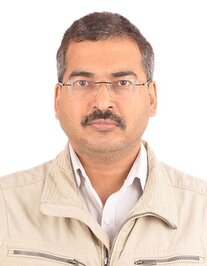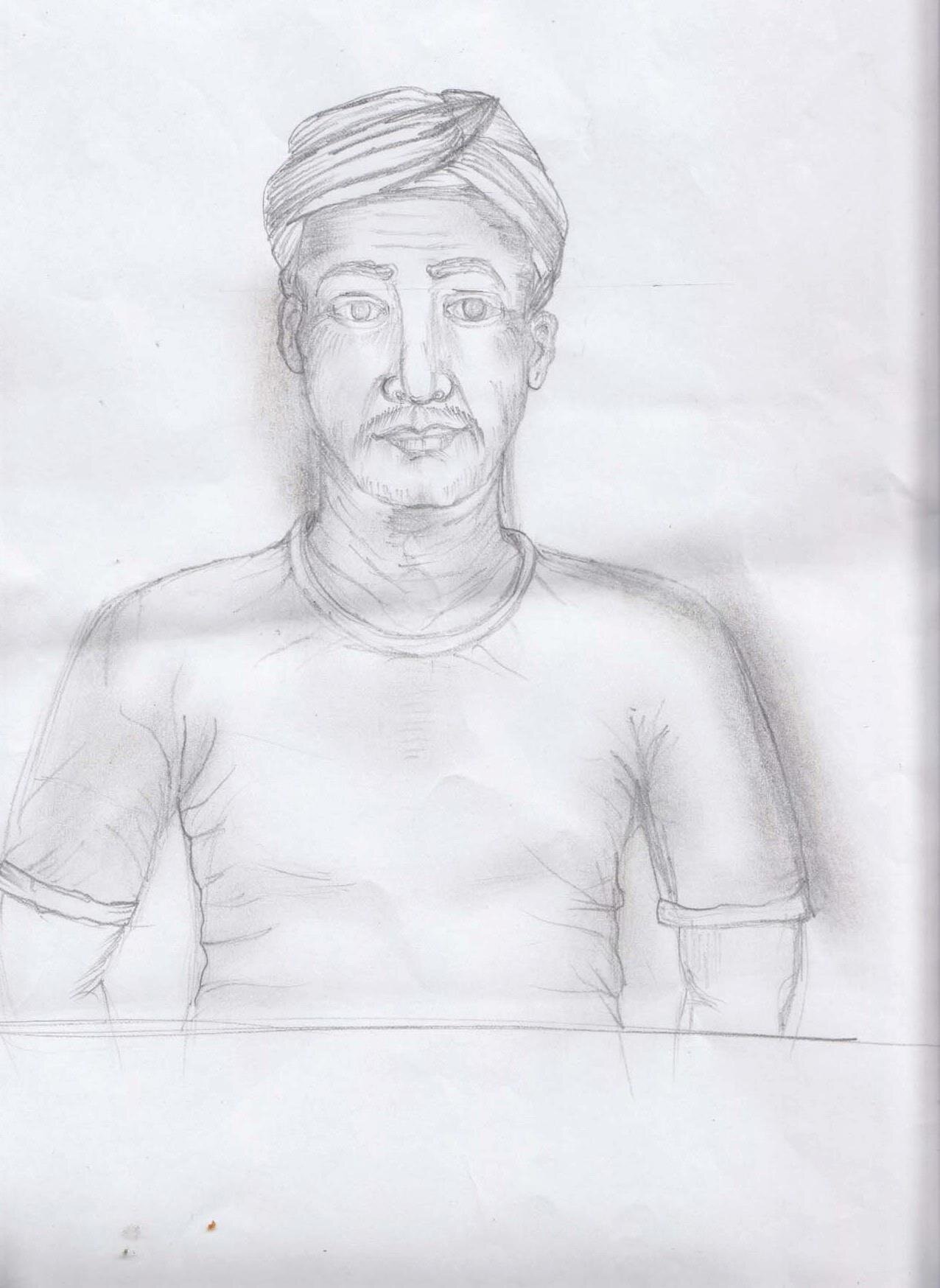
Gajendra Thakur
The Maithili Short story 'Tashkar' by Gajendra Thakur was translated into English by the author himself.
The Robber (Tashkar)
1
Inside the Shaligram-stone a hole exists, the black shaligram stone is found near the river Narmada. In Jamsam village much has changed, right from the Dihbar-worship place of the village deity to other things, but some of the other symbolic things are present. But any symbolic existence of my love story is not present anymore.
The plantation and the jungle have become sparse now. When I was a child, the mango orchard was full of underground passages and holes made by animals. It was full of distinct kinds of birds and big and small animals. From the month of Jyestha to Agahan, Malati and I used to gossip around the khurchania-creeper. During the Phalgun-Chaitra month, we used to have endless conversations near the lavanglata bush. Malkoka, Kumud, Bhent, Kamalgatta-root, the reddish-Bisadh: we were in search of these, wandering through the mud and muddy water. Barefooted, we hopped around thorny bushes and played a game of 'seven houses' in the mango orchard. We used to make our imaginary home with the karbir-bush. Malati is used to preserve the seeds of flowers.
Malati was the same age as me. My mother used to say that Malati was six months older than me, but my father used to tell me that she was six months younger than me. Why he used to tell this, I came to understand much later.
During the entire mango season, Malati and I guarded the mango orchard. But at dusk, before night fell, my maternal uncle Bachhru and Malati's father Khagnathji would come to the orchard to guard it during the night. But here also there is no symbolic presence of our love tales. I mean, the love story of Keshav and Malati.
But there at the Pucca village deity spot, I try to look for the black Shaligram-stone, which has a hole inside. I had stealthily placed the stone here somewhere.
The villagers had spent a lot to make the dome for the village-deity place. Earlier there was nothing here. The stairways for the pond had been constructed by the King and this pucca temple; only these two things still existed. But the poor King could not worship here; out of dishonour, he did not come to this village.
2
I am Keshav, from village Mangarauni, of Naraune Sulhane root, gotra Parashar, son of Poet Madhurapati.
Malati was the daughter of Khagnath Jha of Mandar Sihaul root, and Kashyap gotra of village Jamsam.
Khagnathji and my maternal uncle Bachhru were close friends. My Bachhru mama hailed from Jamsam village. He was well-to-do and we were poor. So, for the one-month summer vacation and the fifteen-day Durga pooja holidays till Chhath pooja, I used to stay in my maternal uncle's village. During the summer vacations, I would guard the mango orchard, watching the ripening of the early 'White' mango variety to late the 'Kalkatia' mango variety. During Durga pooja, we enjoyed the celebrations right from the first day till the immersion ceremony. Again, during the Deepawali festival, I lit the bamboo leaves and returned to my village at the time of the Chhath festival. In between throughout the year, I occasionally visited Jamsam village.
With Malati, I often quarrelled. Once, when I was in the fourth class, during the summer, I was visiting Uncle Bhachhru's mango orchard. I quarrelled and stopped talking to Malati since I was angry. However, I forgave her soon and resumed chatting with her; Malati always unusually softened me. She never remembered the topic of our quarrels; once I went up to her and said, "I am sorry for that ..."
"For what?" she said.
"For that over which we quarrelled."
I realised neither she nor I remembered what we quarrelled about, so after that, I never fought with her. She, however, often used to get angry with me, and then I would ask her why she was not talking to me. And since she never remembered the matter for which she was angry and neither did I, then what is this quarrel all about?
Life went on in this way. After the summer vacation, I waited for the Durga pooja, and after the Durga pooja vacation, I looked forward to the summer vacation. From when this wait began, I do not remember.
3
Father lived by sharecropping in the village; that is, he worked in the fields of others for a share. After middle school, there was no school for higher education in the vicinity. All the Sanskrit schools had closed.
So, there was no school for me. Year-long, either it was work or vacation. My mother's parents were alive. My mother visited her father's place now and then. I also used to visit my maternal uncle's village often.
There were many problems in that village. I often heard the talk about the 'preservation of Panji' from my father. He also said that this was only possible if I could be married to Malati.
Malati was my friend. But we became distant after the 'preservation of Panji' topic began. The ease with which we met suddenly started to vanish. While seeing her I started imagining her as my wife, and I am sure she must have felt it too.
4
Soon after that, Bachhru's mama came to my village:
Madhurapati: "Bachhru, in your hands now lies all my respect. Khagnath's daughter is simply appropriate for Keshav. She is beautiful and good-natured, but our Keshav is also magnificent. Both are of the same age, but Malati is younger by some days. Oh! You do know that my father gave seven hundred rupees to the bride's father and then my marriage was solemnised, and my father had Panji. But we do not have land now. Yesterday the genealogist came on a mare; the mare was intoxicated after drinking bubble-bubble. He told me at once that only Khagnath's daughter is available, while he prepared the list of the probable. And if that does not happen, I would be debarred from the east-coast Shrotriya's group."
Bachhru: "I am going to ask Khagnath. He is my friend, but what is inside his mind, that only he can tell."
I did not know why my heart was filled with love. I had accompanied Bachhru's mama to his village.
5
Malati: "Keshav, if you are married to somebody else then how can we meet?"
Keshav: "If you were married to somebody else, then how you would ask these meaningless questions?"
Malati: "But you understand one thing? Yesterday your maternal uncle was talking to my father regarding our marriage!"
Keshav: "Then?"
Malati: "No, all was well but then a messenger from the King of Darbhanga came to say that he had a message to convey from the King".
Keshav: "What was the message from the King?"
Malati: "I do not know. But the messenger told my father not to finalise my marriage for some time."
Keshav: "You are so beautiful. The King must have seen some boy for you."
Malati: "I do not know..."
6
The caravan of the king's minister stood in front of Khagnathji's house! What changes happened in these two days? The messenger had passed on some messages. So Khagnathji is in such a hurry now, for the marriage of his daughter! See the swiftness. People reached there in large numbers, and all were busy with the welcome ceremony. I too was observing everything. By evening my father had also come. There went the minister's caravan and my father's hand touched his forehead. And he then relapsed into silence. Khagnathji was also silent.
The King had sent a proposal for his marriage to Malati! King Bireshwar Singh. What a shame! He must have been over forty years of age and this proposal of marriage with a thirteen or fourteen-year-old girl? What was the status of Khagnathji, how could he oppose the proposal?
My father was anxious; the Panji would not be preserved.
On that day, in the evening, I met Malati near the corner of her house. Her big eyes, like the Karjani, were swollen; it looked like she had wept without consolation, for hours. What I said to her, I do not remember. Yes, but in the end, I told her that everything would be all right.
7
In Jamsam village, the marriage proposal was solemnised between King Bireshwar Singh and Malati.
Also, in Jamsam village, a pond was dug. Beside the pond, a new temple was constructed; how could the King worship in a temple constructed by others?
But I, Keshav, was the son of Poet Madhurapati!
The marriage date came closer. There were no other auspicious dates during that season. That evening I told my plans to Malati.
In a wooden cart, the front part as well as the back remains unstable. The pressure on the front must be more because otherwise, the back would be unstable, and the cart would tumble. But I balanced the back of the cart, and I waited for Malati near the bamboo trees.
She came and sat on the cart. Whoever saw me on the road did not talk to me for fear that the cart would tumble. She saw a colourful Patrangi bird and nearly exclaimed aloud; I put my fingers on her lips.
I brought Malati to my village. The wedding preparations had started; my dhoti was being coloured for the occasion. Somebody came from Malati's village to enquire about her; I captured that person and hold him back. When the question arose in my village, "Who would perform the ceremony of kanyadaan from the bride's side", I brought out that person. I said, "He is from the bride's village, so he will perform kanyadaan."
I put down the leather Salamshahi shoe, wore a dhoti and performed the marriage rites. The vermillion ceremony, where the sacred vermillion is placed on Malati's head was fated to be performed only by my hand.
8
Now, what would King Bireshwar Singh do?
He called the genealogist and ordered him to place the derogatory title of "Tashkar" - robber - before my name in the Panji. But Madhurapati was full of pride for his son. A tiger's son is again a tiger! Panji and water both go downwards, as courage flows down from father to son. But after Tashkar Keshav marries Khagnath Jha of Srikant Jha Panji's daughter, Madhurapati's shrotriya category would remain in existence.
And after one hundred years, a play is going to be performed in this village: "Sultana- the Robber!"
And I, Tashkar Keshav, from root Mangrauni Naraune Sulhani of Parashar gotra, son of Poet Madhurapati, am looking for symbols of my love story in this village Jamsam. But only that pond built by King Bireshwar Singh and the dilapidated temple could be seen. Poor King, he did not come again to this village out of shame.
This pond and the dilapidated temple are the remains of our love.
अपन मंतव्य editorial.staff.videha@zohomail.in पर पठाउ।
